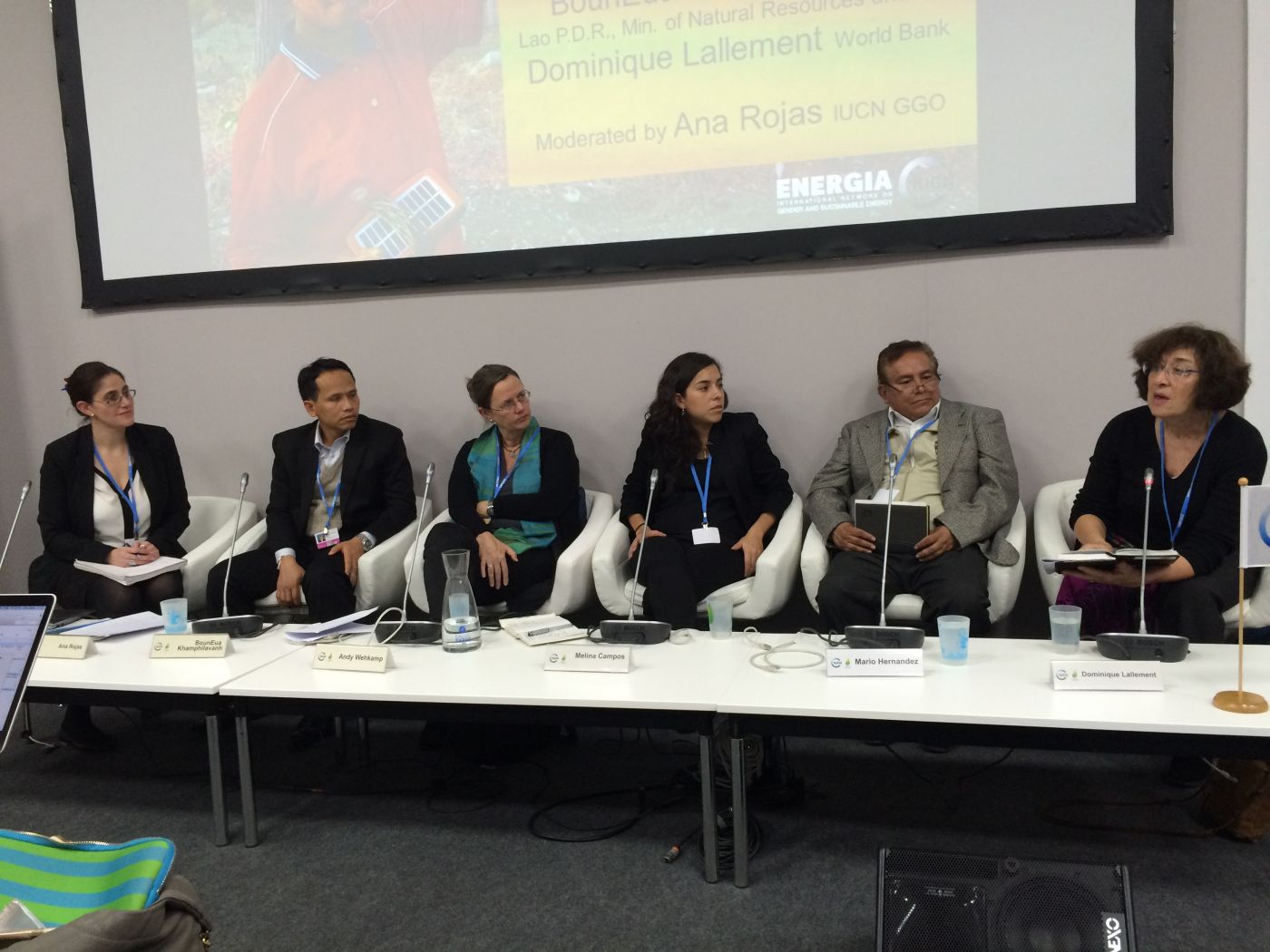Earlier this month, during the 21st Conference Of Parties to the United Nations Framework Convention on Climate Change (COP21) in Paris, ENERGIA and IUCN held a side event with their partners and allies to discuss the role that gender responsiveness should play in these – and future – climate talks. The event took place on December 7th in the IUCN Pavilion, UNFCCC Blue Zone. A lively discussion ensued between panelists that covered issues from renewable energy as a pathway to women’s empowerment to the power that business training and coaching has to transform women into leaders of their communities.
The event was moderated by Ana Rojas of the IUCN Global Gender Office and the panelists included
Melina Campos, Climate Change, Energy and Development Coordinator, Hivos
Andy Wehkamp, Managing Director for Renewable Energy, SNV
Mario Hernandez, Executive Director, Semilla de Sol, Guatemala
Dominique Lallement, Gender consultant, World Bank
BouanEua Khamphilavanh, Ministry of Natural Resources and Environment of the Lao PDR
As experience from our many partners show, integrating a gender lens into climate change and energy solutions has the possibility of magnifying the impact of projects around the world. Organizations like Semilla del Sol prove that bringing women into the conversation on a local level creates a more integrated and effective solution for communities. During the conversation on the 7th, Mario Hernandez detailed the intricate local solution that Semilla del Sol brings to communities in Guatemala. He talked about their multi-level approach to bringing stakeholders together and how they integrated indigenous knowledge and cooking traditions into their solutions to help ensure long-term adoption.
Dominique Lallement of the World Bank brought a country-level perspective as she discussed gender inclusion in the policies of the Green Climate Fund. “We shouldn’t think only small but big”, Lallement told the audience during the discussions, noting that in addition to local-level projects like those Hernandez discussed, large scale gender-inclusive projects and policies should be implemented.
Andy Wehkamp of SNV discussed the need to stop looking at women as only beneficiaries of energy and climate projects but rather to look to them for solutions. Wehkamp noted that women should be integrated at all levels of projects and that additional funding should be applied to this goal. Melina Campos of Hivos seconded this thought noting that Hivos is working to ensure that women aren’t just empowered in life but that they are empowered to become leaders. Campos added that ENERGIA and Hivos are working together to help implement policies that will support this on national and international levels.
BouanEua Khamphilavanh brought the perspective of a government into the mix, noting that though Laos has a climate change strategy and an Action Plan, neither currently have gender considerations. The government is working to fix this oversight now. They are also partnering with organizations to work towards local-level gender inclusion in the meantime. Currently, SNV is helping to distribute improved cookstoves to local communities.
Panelists brought in examples of great training models from around the world – like the model at the Barefoot College in India – which they believe can be replicated elsewhere. All of the participants agreed that training and capacity building is key to ensure that women become integrated into climate and energy solutions around the globe. Creating female leaders is key to a successful future in both these areas.
“For me all the success stories provided lessons worth emulating in my home country, Ghana. It indicates that with due diligence, proper planning, capacity building and adding value to the work women do, much can be achieved,” said Faustina Araba Boakye of [not sure of her title], who was in attendance on the 7th.
“Lessons from these conversations can be evidence of proof about how mainstreaming gender and allowing women participation and voice can bring about tremendous results and solutions to addressing climate change,” Faustina added. “After all, women are most affected by the impacts of climate change, a reality that should be accepted by all.”











Follow us on: